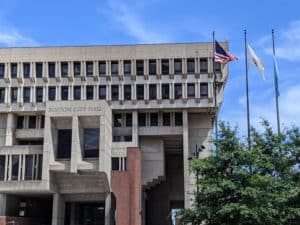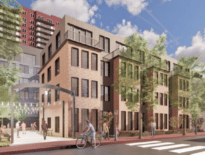Wu administration officials have presented a plan to a commission of tenant activists and real estate industry figures that would see a rent cap return to the city for the first time in nearly 30 years.
The Boston Globe reported Wednesday afternoon that Mayor Michelle Wu is considering a 6 percent-per-year limit on rent increases, plus an allowance for inflation as measured by the consumer price index, with an overall 10 percent ceiling on annual rent increases. The policy would only apply to buildings over 15 years old, around twice as long as many real estate investors hold buildings. It would exempt “small owner-occupied properties such as three-deckers,” according to the Globe, appearing to address vocal concerns from the city’s smallest landlords.
The proposal is similar to ideas that have gained popularity in other cities and states, dubbed “rent control 2.0” by scholars, that are less restrictive than earlier policies like those outlawed statewide in 1994.
To enter into law, the proposal would have to be passed first by the City Council, then get approval from the state legislature through the home rule petition process. It’s not an arena where Boston mayors have always found success, although in a departure from her predecessor, Gov. Maura Healey has indicated her willingness to entertain local-option rent control or “rent stabilization” measures, and a poll of Massachusetts voters taken last summer shows support for the idea to let individual municipalities curb excessive rent hikes if they want to.
City Seeks ‘Stakeholder Feedback’
In a statement to Banker & Tradesman, Wu’s office confirmed details of the plan as reported by the Globe and sought to suggest that the plan presented to the Rent Stabilization Advisory Committee on Tuesday may still change before it arrives on city councilors’ desks at a future date.
“We continue to work with the advisory committee toward specific legislative language that would protect families from rent gouging and displacement as our city continues to grow. We look forward to receiving additional stakeholder feedback before filing a proposal with the city council,” the statement said.
When asked, Wu’s office declined to be more specific about when the mayor intends to file a formal proposal with the City Council.
The proposal comes as economic data shows the large rent increases of 2021 and early 2022 are fading, with rents up a mere 6 percent year-over-year in Greater Boston in December, according to real estate data firm Yardi Matrix. The company’s most recent report found that rents actually fell in the area from November 2022 to December 2022 by a little over 1 percent for both luxury properties and those that cater to “renters by necessity.” But those decreases still left the median rent for a two-bedroom apartment in the Boston area at around $3,400 per month, according to apartment listings site Zumper.
Trade Group: ‘Not the Way to Do It’
Commercial real estate trade group NAIOP-MA criticized the proposal as reported by the Globe, saying it would harm the mayor’s stated goal of adding significantly more housing to the city.
“No one can argue with the fact that Boston needs more housing. The city lags behind other markets with respect to new production and the result is the existing housing crisis. Rent control is a proven way to slow the production of new housing. Further, it negatively impacts existing housing by reducing the overall supply of rental units and, as we saw when this was last in effect in Boston, it decreases the quality of the existing units. If Boston wants to address the housing crisis, this is not the way to do it,” NAIOP-MA CEO Tamara Small said in an email.
In response to the Globe’s report, the Greater Boston Real Estate Board CEO Greg Vasil called rent control “a failed policy solution” and suggested that the slowdown in the city’s multifamily development pipeline made this an inopportune time to implement such a dramatic change.
“Rent control also limits property tax collections: an especially harmful outcome for a city like Boston, which heavily depends on property taxes as a source of revenue. Instead of pursuing rent control, Mayor Wu and the City Council should focus on pro-housing policies to move Boston forward not backward. The city should eliminate red tape and encourage production – steps critical to helping the region overcome the housing crisis,” Vasil said in a statement.
In an email to Banker & Tradesman, MassLandlords Executive Director Doug Quattrochi also raised concerns that rent control could disproportionately benefit better-off renters.
“In the ’70s and ’80s, rent controlled units were rented preferentially to high income households with perfect credit. The effect over decades was rent controlled units were full of wealthy, successful people like Cambridge Mayor Ken Reeves, judge Ruth Abrams, and others. With the exception of certain lucky folks, like Mayor Reeves, rent controlled units where disproportionately full of white people. Fixing that problem is not in Boston’s plan,” he said.
At least one top tenant’s rights activist also publicly blasted Wu’s proposal Thursday. In a series of tweets, City Life/Vida Urbana Co-Executive Director Mike Leyba pledged to oppose the plan, calling it “not even rent control.”
“This proposal would only do half the job. It would allow rents to continue to rise by hundreds of dollars per month every lease cycle, eventually pricing working-class families out of Boston rentals altogether,” he wrote. “This proposal does not address the long-term needs of those most directly impacted by displacement, only buy them a bit more time and a lot more stress before they’re pushed out of the neighborhood. It does not close the racial wealth gap, it will widen it.”
Investors Leery of Rent-Controlled Properties
Ryan McDonough, a principal at developer Marcus Partners, explained to an audience at an industry forum Wednesday morning that rent control measures will hamper the ability to find investors willing to buy an apartment building once it’s built or renovated, a key component of many developers’ and investors’ business models.
“The bigger concern we have in Greater Boston is the potential for rent stabilization, which would have a significant impact on your exit value if you’re going to build something or buy something and sell. It has a material impact on investor interest on your exit,” he said.
At the same time, said developer Daryl Settles, it’s clear a solution to the region’s affordability problems must be found.
“It’s a struggle for us and a struggle for everyone to figure it out. I truly believe this needs to be a just society – it can’t only be [the real estate industry] making money and living well. I don’t have the answers for it, but I think we’ve really got to keep this in mind going forward. If we keep going in the direction we’re going in, there’s going to be a revolt and it’s not going to be good for any of us or our children,” said Settles, a managing partner at developer Catalyst Ventures and a fellow panelist at the forum organized by NAIOP-MA at the Westin Waterfront Hotel in Boston.
This story has been updated with comments from the Greater Boston Real Estate Board, City Life/Vida Urbana and MassLandlords.




 |
| 


